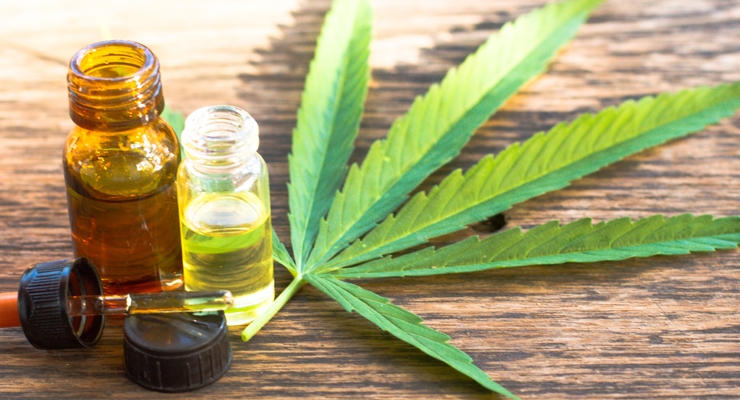Columns
Confusion Over Cannabis & The Fate of CBD
Fair and reasonable or not, FDA could very well be a major buzzkill in the CBD supplement sector.

By: Erik Goldman

“If you’re going to push the envelope, don’t be dumb about it.” That sums up attorney Ivan Wasserman’s most basic advice for dietary supplement companies selling cannibidiol (CBD) or any other cannabis-derived products.
One could argue that from a regulatory viewpoint, CBD is the envelope. Anyone paying attention to this industry knows there are hundreds of supplement companies willing to push it.
This year’s Natural Products Expo West made plain the extent to which CBD has entered into and invigorated the supplement market. The practitioner channel is no exception: several major practitioner-only players, including Thorne Research and Designs for Health, have already launched cannabis/hemp-based products, and rumor has it that several others are following suit.
Further, cannabis-specific companies, like Encore Life, have launched new practitioner-targeted CBD lines. And some wildly popular consumer-focused CBD brands like Charlotte’s Web are now marketing at integrative and functional medicine conferences alongside the well-established practitioner-facing nutraceutical companies. All of this is distinct from, though related to, the medical marijuana industry, which is also growing rapidly in states in which it is legal.
In short, cannabis has a lot of people seeing green these days; except, of course, for the regulators—and a little drug company called GW Pharmaceuticals—who are definitely seeing red. The Federal government has shown every intention of spoiling the CBD supplement party, and GW is very likely to emerge the big winner.
Seeing Green, Ignoring Red
“Nothing is moving faster than CBD and cannabis,” said Mr. Wasserman, a partner with Amin Talati Upadhye. He has worked with several companies playing in the rapidly shifting CBD/cannabis space.
Speaking at Holistic Primary Care’s recent Practitioner Channel Forum, he noted the cannabis category’s growth potential is more than matched by its regulatory complexity and its potential for oversteps, marketing misfires, and quality assurance nightmares.
Exuberance about booming sales can easily woo companies to forget two essential rules: 1) don’t turn scientific communication into commercial speech; 2) don’t be false, misleading, or fraudulent in your marketing communications.
In today’s turbo-charged CBD/cannabis space, Mr. Wasserman sees companies doing both. Yes, there is a burgeoning body of medical research showing that CBD and other compounds derived from cannabis affect multiple physiological processes, and that they can offer benefits for people struggling with a wide range of physical and psychological conditions.
But as with any supplement ingredient, scientific data are not a license to make disease claims. “Commercial speech”—even if based on good science—is rampant in the cannabis/CBD market, more so on the consumer/retail side than in the practitioner channel, where marketers are more cautious.
But on both sides of that increasingly porous divide, there’s a gold rush around CBD and cannabis. Some marketers are either forgetting that disease-focused claims are illegal, or in the spirit of marijuana’s outlaw status, they’re choosing to cross the line.
And let’s face it: at the federal level, cannabis is still illegal. Todd Harrison, a partner with Venable LLP, who also spoke at the Forum, said the bottom line is that the Drug Enforcement Administration (DEA) still considers marijuana to be a Schedule 1 narcotic, despite any and all other state-level laws that rule otherwise. And by “marijuana,” the DEA means all parts of the Cannabis sativa plant—the seeds, the leaves, the stalks, the resin, everything.
Strange Politics
Despite all industry arguments to the contrary, “Hemp” and Cannabis are the same in the eyes of the law. The sole difference is the relative content of tetrahydrocannabinol (THC). To be recognized as “industrial hemp” the plant—and any extracts derived from it—must contain no more than 0.3% THC on a dry weight basis.
The Hemp Industries Association (HIA) recently tried and failed to change the DEA’s classifications. Mr. Harrison explained that the HIA sought to have hemp extracts delisted as controlled substances on the grounds that the DEA’s classification was not consistent with the definition or intent of the definition of marijuana in the original Controlled Substances Act, and that it conflicted with industrial hemp provisions in the Agricultural Act (aka the Farm Bill). The 9th Circuit Court did not agree. “Basically, they punted,” Mr. Harrison said.
In April, Senator Mitch McConnell (R-KY) introduced the Hemp Farming Act of 2018 into the Senate, with an identical bill brought to the House. The bill would exempt hemp (containing less than 0.3% THC) from the federal definition of “marijuana” under the Controlled Substances Act. It would give state governments and Native American tribal authorities primary regulatory authority over production of hemp, and the opportunity to submit proposals to the U.S. Secretary of Agriculture detailing how they would regulate hemp production and distribution.
The bill induced euphoria among many in the hemp industry, leading some to canonize the arch-conservative Sen. McConnell as the new patron saint of herb.
But as with just about everything else on today’s legislative scene, the Hemp Farming Act is a political football. Senator Chuck Grassley (R-IA) opted to break ranks with Sen. McConnell and introduced an amendment that would explicitly exclude “cannabinoids,” “extracts,” and “derivatives” from the Farm Bill’s definition of industrial hemp; that basically means CBD. Sen. Grassley’s amendment was shot down in the Senate committee hearings, but the Iowa senator said he remains committed to pushing for these exclusions.
Mr. Harrison, who works in D.C., believes Sen. McConnell’s hemp bill will ultimately pass. It has bipartisan support—Senate minority leader Chuck Schumer (D-NY) is on board—and won’t likely run into any opposition from the Oval Office. “I don’t think Trump cares one way or the other.”
Drug or Dietary Supplement?
So, yes, hemp will likely be de-scheduled. But that won’t change the game much for companies marketing CBD or any hemp-derived substances as dietary supplements. First, CBD is derived from the resin of the cannabis plant, not the seeds, so any company claiming to have “seed-derived CBD oil” is selling hemp seed oil with added CBD.
And since, by DEA statutes, the resin counts as “marijuana,” CBD counts as “marijuana” despite the wishes of the cannabis industry and its many millions of customers. Further, low-THC hemp strains tend to produce very little CBD-containing resin, which means that most CBD will be coming from straight-up cannabis, not “hemp.”
Second, while Sen. McConnell’s bill would redefine hemp as distinct from marijuana, it says nothing about the freedom to market hemp-derived products, despite what the marijuana lawyers will tell you. If it all sounds like a big game of semantics, it is. But the words and definitions are delineating the terms of engagement in the market, and the positions that regulators are going to take.
Mr. Harrison said there’s currently no legitimate way to claim CBD is a dietary supplement. The FDA has made it very clear that it does not consider CBD to be a dietary supplement, based on the fact that GW Pharmaceuticals had filed Investigational New Drug applications for its CBD-based drug products years back in 2014. The company’s Sativex (Nabiximols)—an oral spray for use to treat pain and spasticity in people with multiple sclerosis—was approved as a drug in the U.K. in 2010.
FDA approved the company’s Epidiolex product as a prescription form of CBD for childhood epilepsy at the end of June.
Basically, the FDA has taken the position that since GW has developed CBD as a prescription drug, it cannot therefore be sold as a supplement unless a company can definitively prove that it was marketing CBD as a dietary supplement or conventional food before GW’s INDs were authorized. That, according to Mr. Harrison, is going to be a difficult feat.
With GW’s Epidiolex approved as a prescription drug, one could expect tougher enforcement action against companies selling CBD as a supplement. FDA probably won’t take issue with companies selling hemp seed or hemp seed oil as foods, according to Mr. Harrison.
It will be much harder to make the case that hemp stalks, leaves or flowers—which contain the CBD-rich resin—are or ever were a food source for humans.
Fair and reasonable or not, FDA could very well be a major buzzkill in the CBD supplement sector. Mr. Harrison expects the agency will feel a strong “duty to enforce” once it grants drug approval for Epidiolex. “If the FDA doesn’t enforce, they will have made a mockery of the Food, Drug and Cosmetic Act.”
In the meantime, sales of CBD are booming. Retailers speaking at a CBD Summit that preceded Expo West this year noted that CBD products are moving off the shelves as fast or even faster than more common—and less controversial—supplements like omega-3s or probiotics.
The surge is driven in part by consumers’ fears that once Epidiolex is approved, CBD will no longer be freely available without prescription.
Practitioner Perspectives
How do medical professionals feel about cannabis and CBD? According to Holistic Primary Care’s 2018 clinician survey, the attitudes are generally positive, at least among holistic and functional medicine practitioners. Many are already on board with CBD, and others are interested and willing to learn.
The survey, which fielded from March through May of this year, and obtained responses from 469 practitioners, included the following question: “In recent years, interest in cannabis and cannabis-derived substances like CBD has soared among researchers, clinicians, and the general public. Which statement best describes your views on Cannabis and CBD?”
- 56% chose “CBD & cannabis-derived substances have therapeutic value and should be used more widely”;
- 26% chose “CBD & cannabis have clinical value, but should only be available by prescription from a licensed practitioner”;
- 17% chose “I am not yet convinced that CBD or cannabis have therapeutic value, but I am open to seeing further research”;
- 2% chose “Neither cannabis nor CBD have therapeutic benefits; they are drugs of abuse and do not belong in any legitimate medical practice.
But overall, acceptance of CBD and, to a lesser extent medical cannabis, as legitimate medicine is quite high among today’s clinicians. Only a small percentage sees these substances exclusively as noxious drugs of abuse. One quarter (24%) of respondents said they are already dispensing or recommending CBD but not cannabis itself. Only 1% are recommending or dispensing cannabis but not CBD.
Nearly one-third (29%) are recommending or dispensing both CBD and cannabis, and 28% are considering the possibility of recommending or dispensing CBD or other cannabis products.
Are practitioners who dispense or recommend CBD supplements crossing legal lines? They could be. While regulators are generally unwilling to interfere with practitioner-patient relationships, or challenging the “learned intermediary” status that medical professionals hold, they might feel emboldened to do so in the case of cannabis-related products, especially in the wake of a newly approved Rx-only product.
Mr. Harrison believes physicians are taking some legal risk in “marketing an ingredient the DEA considers a controlled substance.” He added that companies selling these products to and through doctors are also taking calculated risks.
Whether the laws are reasonable or not, whether they serve the best interests of practitioners or patients is certainly up for debate. What’s not debatable is the public’s interest in and desire for freely accessible non-Rx forms of CBD. But from a practical point of view, what really matters is the scope and intensity of FDA and DEA enforcement of existing statutes around CBD and cannabis.
It remains to be seen whether federal agencies will continue to permit widespread sale of non-Rx CBD as dietary supplements, and frankly whether they have the budgets and personnel needed to do much more than issue a lot of stern warning letters.
Erik Goldman
Holistic Primary Care
Erik Goldman is co-founder and editor of Holistic Primary Care: News for Health & Healing, a quarterly medical publication reaching about 60,000 physicians and other healthcare professionals nationwide. He is also co-producer of the Practitioner Channel Forum, the nation’s leading conference focused on opportunities and challenges in the practitioner segment of the dietary supplement industry.


